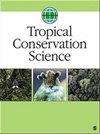Will Tanzania’s Wildlife Sector Survive the COVID-19 Pandemic?
IF 1.6
4区 环境科学与生态学
Q2 BIODIVERSITY CONSERVATION
引用次数: 16
Abstract
The COVID-19 pandemic presents a potential threat to wildlife resources in Africa. In this review, using Tanzania as a case, we examine the impacts and risks that wildlife sectors in Africa are facing or are likely to face as a result of this pandemic. We recognize loss of revenues from tourism as a major impact that could negatively influence the management of wildlife species and habitats. Loss of tourism revenues reduces capacity of the conservation agencies to fund conservation operations and support the benefit sharing schemes. Furthermore, it undermines the efficacy of conservation to compete with alternative economic activities which are ecologically damaging. Increased unemployment and household poverty due to closure of businesses may exacerbate wildlife crime and unsustainable activities. Additionally, contributions from donor-funding organizations and development partners cannot be guaranteed as revenues may be diverted to support other sectors including health. In order to address and minimize the impacts and reduce the risks to the wildlife sector, the following policy measures are recommended: ensure adequate budget for conservation; develop a crisis management plan; reconsider protocols for conducting wildlife trade; develop a comprehensive tourism recovery plan; promote scientific studies focusing on zoonoses and adopt a One-Health Approach as a matter of urgency in dealing with COVID-19 and future pandemics.坦桑尼亚的野生动物部门能否在COVID-19大流行中幸存下来?
新冠肺炎大流行对非洲野生动物资源构成潜在威胁。在这篇综述中,我们以坦桑尼亚为例,研究了非洲野生动物部门因这场疫情而面临或可能面临的影响和风险。我们认识到旅游业收入的损失是一个重大影响,可能会对野生动物物种和栖息地的管理产生负面影响。旅游收入的损失降低了保护机构为保护行动提供资金和支持利益分享计划的能力。此外,与破坏生态的替代经济活动竞争会破坏保护的效力。企业倒闭导致的失业率和家庭贫困增加可能会加剧野生动物犯罪和不可持续的活动。此外,捐助资助组织和发展伙伴的捐款无法得到保证,因为收入可能被转用于支持包括卫生在内的其他部门。为了解决并最大限度地减少对野生动物部门的影响和风险,建议采取以下政策措施:确保有足够的保护预算;制定危机管理计划;重新考虑野生动物贸易的议定书;制定一项全面的旅游业恢复计划;促进以人畜共患病为重点的科学研究,并作为应对新冠肺炎和未来流行病的紧急事项,采用“一个健康的方法”。
本文章由计算机程序翻译,如有差异,请以英文原文为准。
求助全文
约1分钟内获得全文
求助全文
来源期刊

Tropical Conservation Science
BIODIVERSITY CONSERVATION-
CiteScore
3.60
自引率
5.90%
发文量
16
审稿时长
>12 weeks
期刊介绍:
Tropical Conservation Science is a peer-reviewed, open access journal that publishes original research papers and state-of-the-art reviews of broad interest to the field of conservation of tropical forests and of other tropical ecosystems.
 求助内容:
求助内容: 应助结果提醒方式:
应助结果提醒方式:


